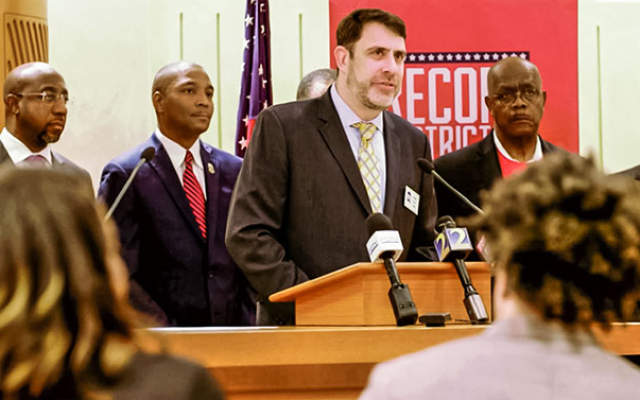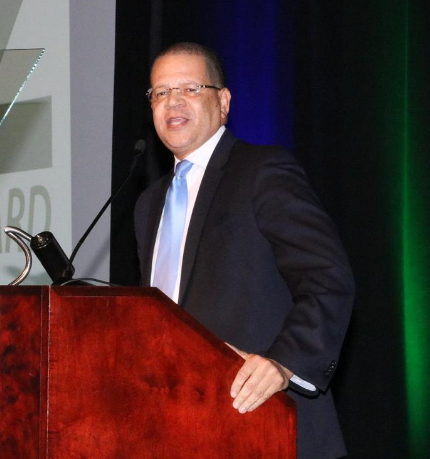Volunteers Drive The Temple’s Criminal Justice Program
A film screened at the first Human Rights Film Festival featured Rabbi Peter Berg and John Eaves and their work in helping Georgians move forward beyond their criminal records.

Peter Berg, The Temple’s senior rabbi, plays a major role in a short documentary, “Faith in Action,” shown this week at the first Human Rights Film Festival at Morehouse College.
Berg, who is featured in the film, is an enthusiastic supporter of a project that helps remove, under certain conditions, criminal acts from the public records of local residents charged and even convicted of specific crimes.
“Our Jewish narrative is ‘Let My People Go,’ and G-d set us free,” Berg said. “I can’t think of an area in American life where the legacy of racism and slavery is more clear than the current criminal justice system that we have.”
John Eaves, who is an African American member of The Temple, also is prominently featured in the film. He spearheaded the project.
Four years ago, when he was looking for an innovative criminal justice program, he stumbled upon a one-day event in Chicago that allowed some people to erase their long-standing criminal charges from their public records.
Eaves was chairman of the Fulton County Commission at the time. He thought the program would be a boon to residents of the county who had arrest records for relatively minor charges. Because of their records they often had difficulty finding employment, housing and educational opportunities.
The film shown Oct. 10 at the Morehouse film festival highlights the one-day event last year at The Temple, which had the bipartisan support of Georgia’s governor and Atlanta’s mayor, and helped over 300 persons walk free with clear records.

Today, Eaves, who volunteers as head of The Temple’s Racial Justice Committee, is back in private life. He’s preparing for what has become an annual event to help otherwise law-abiding citizens shed their criminal records. What is billed as Atlanta’s Records Restriction Summit is being held for the second year at The Temple on Veterans Day, Nov. 11. The event, as Eaves sees it, is a part of the obligation Jews have to social justice.
“It’s a natural fit for Jewish congregations to participate in this program. It’s an opportunity to reintegrate those who have served their time or had an old charge that was never prosecuted. It’s a part of our religious mandate to help them become productive once again.”
This year’s program at The Temple is being produced with the help of the Georgia Justice Project, attorneys who volunteer, and literally dozens of others who have donated their time to help prepare the paperwork that is a part of the legal process.
Berg estimates that if each individual who is helped had to do the expungement themselves, it would cost about $3,500 each, take over 120 days to process and require visits to as many as 12 government agencies.
“We asked ourselves, what if we had the judges in Fulton County come into The Temple and we would expunge their record on the spot?” Berg said. “It’s really a mirror of our times that challenges us to be more giving of ourselves and to reflect the work of resolving racism and inequality in our society.”
If there are 1.5 million open criminal charges in Fulton County, which has one of the largest prison populations in the country, Eaves figures Georgia has 3.8 million open criminal records.
Nationally, America has the largest prison population in the world, according to Eaves. Over 25 percent of all those who are behind bars worldwide are imprisoned in the United States. And in just the last 40 years, the prison population in America has grown by 500 percent, he said.
Also featured in the film is the Rev. Raphael Warnock of Ebenezer Baptist Church in Atlanta, which hosted the first event four years ago.
Berg, Warnock and Eaves have worked together to help churches and synagogues in other cities follow their lead. The producers of the film, Public Square Media in New York, have made a special edition of the film available to anyone who wishes to show it. There is also a 19-page manual available online, at no charge.
In December, the biennial convention of the Union for Reform Judaism has scheduled a program led by Eaves and Rabbi Lydia Medwin of The Temple to introduce the program nationally to Reform temples. Eaves is hopeful that his volunteer work will inspire others.
“I want to become a champion around the country to motivate and inspire other congregations to embrace social justice in general and the reform of the criminal justice system. We as Jews should have an embedded degree of sensitivity toward injustice that other people are experiencing.”
For Eaves, the experience that he’s gained as a volunteer has helped to motivate him to re-enter the political arena. In May he declared his candidacy for the Democratic nomination in Georgia’s 7th Congressional District.
“I absolutely want to raise awareness that we have gotten ourselves into a hole with our criminal justice system. I’m going to make that a key public policy issue of my campaign.”



comments